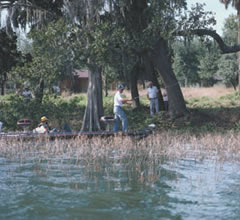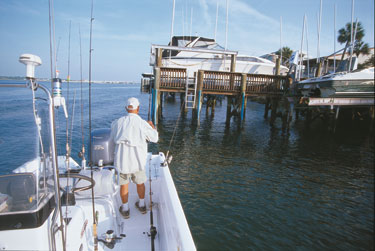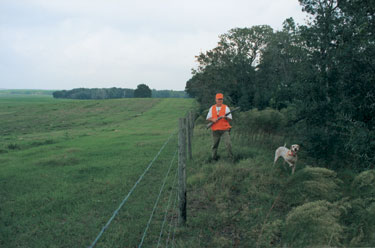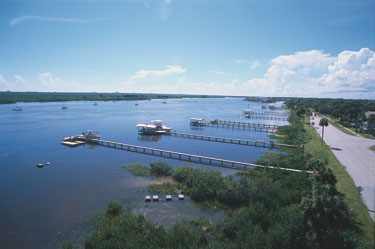December 01, 2005
By Chris Christian
Know your legal protections in the woods and waters.

On most Florida lakes, boaters have the right to fish undisturbed, even close to residential shorelines. |
Holly Hill businessman Darrell Starling had been fishing the Halifax River for over 30 years, and like many inshore anglers he'd learned that the shaded waters around docks can hold a lot of fish. That was the plan he was pursuing on a Sunday morning in April 2005 as he drifted near one of the docks at the NASCAR Marina, just south of the Seabreeze Bridge.
Marina personnel did not view that kindly.
One employee told Starling he could not fish there and that he needed to “move on.” Starling informed the employee that he was on state-owned navigable waters and had every right to do precisely what he was doing. That didn't satisfy the employee, who promptly called the Daytona Beach Police to report a “trespassing fisherman.” Starling was still fishing when the officer arrived, and he told the officer the same thing he told the marina employee.
That didn't satisfy the officer, who promptly motioned Starling to come ashore.
In what some could view as an unwise move, Starling did not comply with the request and headed his boat out into the river. The officer then launched the Department's patrol boat, caught up with Starling later on, and issued him two tickets unrelated to the “trespassing” offense.
Was there actually a trespass offense that precipitated the entire event and the pursuit that resulted in the tickets? No. After a review of the pertinent laws, the Daytona Beach Police Department acknowledged that errors were made in their handling of the incident.
Starling was quite correct in his assertion that he was acting lawfully and should not have been interfered with. In fact, he was “right” enough that the marina employee who initially attempted to run him off, and then called the police, could have been looking at 60 days in jail and a $500 fine!
Florida Statute 372.705, “Harassment of hunters, trappers and fishers,” states:
(1) A person may not intentionally, within a public or privately owned wildlife management or fish management area or on any state-owned water body:
(a) Interfere with or attempt to prevent the lawful taking of fish, game, or nongame animals by another.
(b) Attempt to disturb fish, game or nongame animals or attempt to affect their behavior with the intent to prevent their lawful taking by another.
(1) is guilty of a misdemeanor of the second degree, punishable as provided in s. 775.082 or s. 775.083.
(2) Any person who violates subsection
The latter two statutes set the penalty for a second degree misdemeanor as up to 60 days in jail and a fine of up to $500.
On the surface, the law would seem to be pretty clear-cut. But, given that a significant percentage of the legislators who write the laws are themselves lawyers, it includes the usual assortment of “therefores,” “whereases” and “thembenots” that tend to keep the legal profession both busy and prosperous. In this case, the key words within this law are “public,” “lawful taking,” and “intent.”
“The law only applies to public lands and waters, or other lands or waters that are under the control of the state,” says Lieutenant Bob Lee, a veteran 29-year officer with the Florida Fish and Wildlife Conservation Commission. “It does not apply on private lands, or other properties that are not under state control.”
As the law applies to hunters, it's fairly simple.
If a properly licensed and permitted hunter, during an established hunting season (lawful taking) is on a Wildlife Management Area or other land under state control (public) it would be a violation of the law to intentionally interfere with that hunter's activities.

There's no law against fishing around docks on public coastal waters, as long as you comply with navigation rules and avoid contact with the structure. |
Just what meets the legal definition of “intent” is often determined by plain old common sense. A person who wanders under your tree stand without realizing you are there may have scared off game animals and interfered with your hunting, but there was no intent and no violation occurred. An animal rights activist who circles the tree stand banging two frying pans together obviously has “intent.”
Put that hunter on private land, however, and the picture changes. Remove the “public” aspect and the harassment law does not apply.
“If the hunter has permission to be on that land,” says Lt. Lee, “and he is harassed, you would need to see if the people committing that act also have permission to be there. Most likely they don't, so you would be looking at a trespass case, not a harassment case, and that is how it would be handled.”
Shift from woods to waters, however, and the situation can become quite muddied.
“We get a number of complaints every year,” Lee notes, “especially during the bass bedding season on the St. Johns River, from waterfront property owners that say anglers are fishing too close to their dock. The reality of it is that if that dock is sitting on state-controlled waters, an angler has every right to fish around it. If it's public water it belongs to the public and a legally licensed angler has every right to be there. If that dock happens to be in a canal or boat basin, the situation can get very complex.”
The issue of canals becomes further clouded, because whoever once owned the land and then dug the canal may well have deeded the submerged lands to another entity. In years past it was not uncommon for a private developer to purchase waterfront land, dig a canal, sell multiple lots along it, and then deed the bottom land to state, county or municipal governments so that he would no longer be paying property taxes on land no longer needed. If that is the case and it is state-owned, anglers have legal access, and protection under the law. The same is normally true for city or county ownership, unless specific ordinances prohibit angler use.

It's critical that hunters acknowledge property lines, as trespassing while in possession of a firearm is a felony in Florida. |
Multiple property owners along a canal is often a sign it can be legally fished. But, not always. There have been a few cases where property owners formed an association, achieved title to the bottom lands, and successfully posted it against trespass by nonresidents.
As a general rule, if all land surrounding the canal is owned by a single private entity (individual or corporation) it is a sign that it could be legally posted against entry. Again, however, not always. If the bottom lands under the canal have been deeded to another entity, it depends upon who currently owns it.
“It can be a very complex issue,” explains Lee, “and that is especially true when you get into the waters of the Intracoastal Waterway. Unless an angler does some research on a particular canal, you really can't throw a broad net and say yes you can fish it, or no you can't. Just determining who owns the property around the canal is a start. But, when you are dealing with canals and legal access to them you really need to figure out who owns the land under the canal at the moment. For that, you need to research it at the property appraiser's office in whatever county the canal is in. That will show ownership, and if it is not the state or local government you would need to contact the owner to determine if you can access it.”
The same, surprisingly, can also apply to inland freshwater lakes.
Many anglers assume that Florida's natural lakes are state-owned, and if an angler can legally access the water they can fish it. That's not always true.
There are numerous Spanish Land Grants in Florida. These are lands that were never owned by the state, but deeded directly to an individual or entity by the King of Spain when Florida was a Spanish colony. They create a very complex issue of ownership, and some individuals with Grants have been able to go through the courts and obtain full title to some sizable lakes within their land grant. Believe it or not, there are lakes in Florida where even those people who own lakefront property—sold to them by the lake owner—are legally prohibited from using the lake and have been threatened with trespass charges if they even stand on their own property and cast into it!

This stretch of Intracostal Waterway is like many in Florida, with private docks on public waters. |
The harassment law provides specific legal protection for Florida outdoorsmen. But, only if they are acting lawfully within the parameters of the law. Given the complex nature of riparian rights in Florida, anglers may need to do a little research before they determine that they're right on.
Got Harassed?
A day in the outdoors should be a pleasant experience. Running into someone who intentionally tries to destroy that can make anyone angry. The best advice, is don't get mad.
“The important thing to remember about man-made canals and boat basins,” he continues, “is that before they were dug it was land, and it belonged to someone or some legal entity. Once it was dug, state-owned water may have flowed into it, and it may connect to state-owned navigable waters. But, theoretically, the land under that water still belongs to someone. When an angler is dealing with legal access to a canal the most important thing is to figure out just who owns that bottom land now. Depending upon the ownership, that canal or boat basin might be able to be legally posted, and an angler who enters it and does not leave when properly directed to do so could be charged with trespassing, even if he entered from state-owned public waters.”
Law enforcement professionals advise against confronting the group or individual doing the harassing. Don't start a fight, because they may have come prepared (and even hoping) for one. A common tactic among environmental/animal rights extremist groups is to have local media with them. They want a confrontation. They don't mind looking like extremists if they can get “Joe Hunter” or “Joe Fisherman” to fly off the handle on TV. That's what generates the donations that keep them in business. Don't play into their hands.
If you are dealing with an individual, you really don't know how far they are prepared to go in a confrontation. It's best just to remove yourself from the immediate area.
Before you do, however, a camera can be a very handy thing to have. Take photos of the individuals, especially when they are in a threatening posture, and with some shots being wide enough to show the immediate area.
If you are on public lands or waters (where Florida's hunter/angler harassment law, 372.705, applies) you have every legal right to take those photos. You are, after all, in a public place and gathering legal evidence of a possible criminal offense. Should they interfere with that, they run the risk of upping the “legal ante” from a second-degree misdemeanor to far more serious offenses, especially if they try to take the camera away from you. Now, they could be looking at possible felony crimes, depending upon how stupid they want to be. And, you certainly have the legal right to defend yourself from an attack.
If a camera isn't at hand, treat the situation as you would if you had witnessed a crime, because you may have.
“Get a physical description of the people involved,” says Lt. Lee of the FWC. “That would be age, sex, race, height, weight, distinguishing characteristics and the type of clothing they were wearing. If any boats or vehicles were involved, get their license/registration numbers, and make and model. If possible, remain in the general vicinity, and then call the nearest FWC office.
“FWC is the one to handle this criminal complaint,” Lt. Lee continues. “As effective as the local sheriff's deputies are, they are not always aware of wildlife laws because they don't normally deal with them, and they would usually call us when a wildlife law situation arises. Save yourself the time lag and call FWC first. This is a criminal complaint and we will respond and handle it.”
FS
